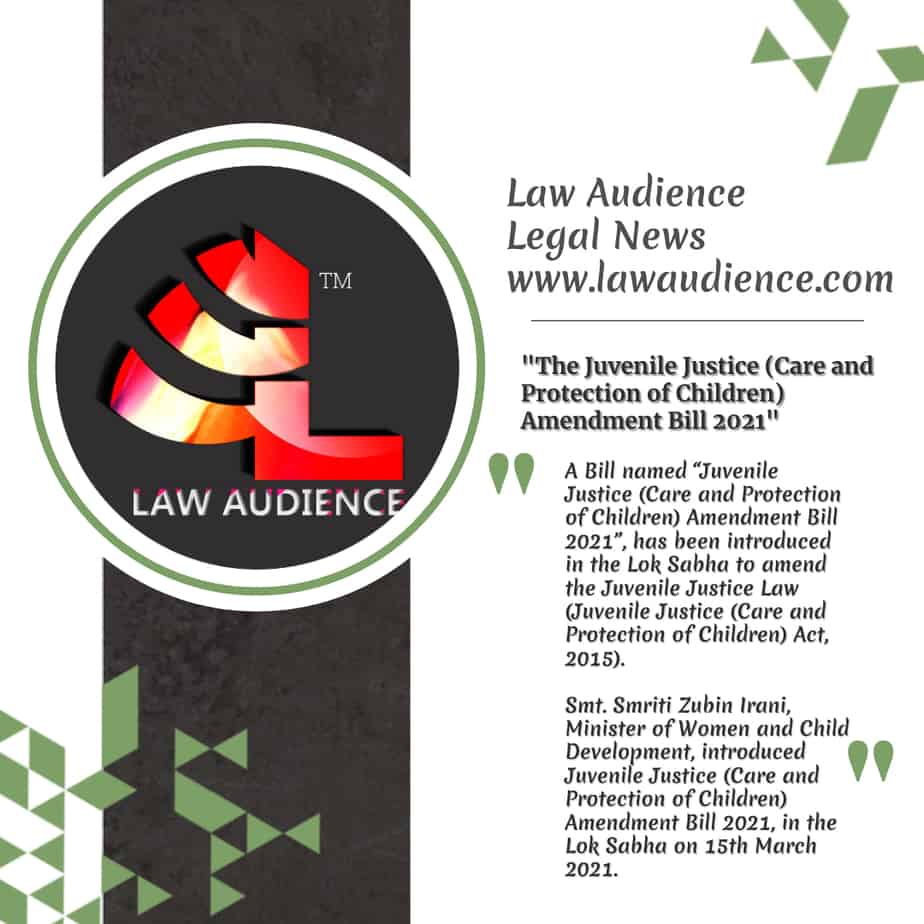A Bill named “Juvenile Justice (Care and Protection of Children) Amendment Bill 2021”, has been introduced in the Lok Sabha to amend the Juvenile Justice Law (JJ Act, 2015). Smt. Smriti Zubin Irani, Minister of Women and Child Development, introduced Juvenile Justice (Care and Protection of Children) Amendment Bill 2021, in the Lok Sabha on 15th March 2021. Dr. Shashi Tharoor opposed the introduction of the Bill and sought clarification from the Minister. The Minister of Women and Child Development; and Minister of Textiles (Smt. Smriti Zubin Irani) replied to the clarificatory question asked by the Member. Thereafter, the motion was adopted and the Bill was introduced.
Juvenile Justice (Care and Protection of Children) Amendment Bill 2021, provides vast powers to District Magistrates & Additional District Magistrates for the purpose of monitoring the process regarding orders of adoption, bill proposes amendment of sub-sec (10) of sec 27 of the JJ Act, 2015, in the following manner “The District Magistrate shall be the grievance redressal authority to entertain any grievance arising out of the functioning of the Committee and the affected child or anyone connected with the child, as the case may be, may file a complaint before the District Magistrate who shall take cognizance of the action of the Committee and, after giving the parties an opportunity of being heard, pass appropriate order and the bill also amended the provisions regarding the Child Welfare Committee to strengthen the Committee”.
The bill also proposes the amendment of provisions of the JJ Act, 2015, dealing with the Child Welfare Committee. Now no person shall be appointed as a member of the Committee “unless he has a degree in child psychology or psychiatry or law or social work or sociology or human health or education or human development or special education for differently abled children and has been actively involved in health, education or welfare activities pertaining to children for seven years or is a practicing professional with a degree in child psychology or psychiatry or law or social work or sociology or human health or education or human development or special education for differently abled children (amendment of Sub-Sec 4 of Section 27 of JJ Act, 2015)”.
A person shall not be eligible for selection as a member of the Child Welfare Committee if he has any past record of child abuse, child labour, violation of human rights or child rights (purposes insertion of sub-sec (4A) to section 27 of JJ Act, 2015). If any person is aggrieved from the adoption order passed by the District Magistrate may, within a period of thirty days from the date of such order passed by the District Magistrate, file an appeal before the Divisional Commissioner, endeavour shall be made to dispose it within a period of four weeks from the date of filing of the appeal (proposes amendment of section 101 of the JJ Act, 2015).
The bill also provides that the Child Welfare Committee under the JJ Act, 2015, shall submit its quarterly report regarding the dead, resorted and runaway children to the State Government and to the District Magistrate (proposes amendment of sec 40 of the JJ Act, 2015).
The Hon’ble Supreme Court in the matter of Shilpa Mittal vs. State of NCT of Delhi (Criminal Appeal No. 34 of 2020), vide its judgment dated the 9th January, 2020 has observed that the Juvenile Justice Act does not deal with the fourth category of offences viz., offence where the maximum sentence is more than seven years imprisonment, but no minimum sentence, or minimum sentence of less than seven years is provided and treated the same as “serious offences” under the Act.
So, Juvenile Justice (Care and Protection of Children) Amendment Bill 2021, also proposes the amendment of clause 54 of section 2of the JJ Act, 2015, in the following manner, ““serious offences includes the offences for which the punishment under the Indian Penal Code or any other law for the time being in force, is,—
(a) minimum imprisonment for a term more than three years and not exceeding seven years; or
(b) maximum imprisonment for a term more than seven years but no minimum imprisonment or minimum imprisonment of less than seven years is provided”.
To download the bill, click here:



